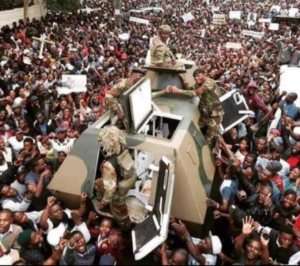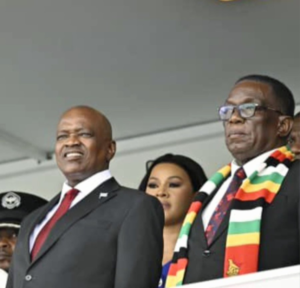ZIMBABWE’S PUSH FOR POWER: MNANGAGWA’S QUEST FOR A THIRD TERM SPARKS CONTROVERSY

In a bold move that has captured the attention of both national and international observers, Zimbabwean President Emmerson Mnangagwa’s undeclared aspirations for a third term have surged forward with full force, signaling a controversial quest to extend his tenure beyond the constitutional limit. The ruling Zanu PF party’s Masvingo province has openly called for Mnangagwa to prolong his rule, challenging the foundational principles of the nation’s governance structure.
During a highly orchestrated event marked by enthusiastic sloganeering, cheers, and ululations, Masvingo provincial chairman Robson Mavhenyengwa led the crowd in a chant that echoed the ambitions of Mnangagwa and his political allies. “2030 vaMnangagwa vanenge vachipo!” he exclaimed, translating to a fervent wish for Mnangagwa’s presence in power until at least 2030, a sentiment that was met with thunderous approval from the audience. This slogan mirrors a similar rallying cry from 2018, which aimed to secure Mnangagwa’s second term, showcasing a strategic and continuous push for extended rule.
The drive for a third term, however, is fraught with legal and constitutional hurdles. Zimbabwe’s constitution, ratified in 2013, explicitly limits the presidency to two five-year terms. According to Section 91(2), any individual who has served two terms, regardless of continuity, is ineligible for reelection. This stipulation places a significant obstacle in Mnangagwa’s path, who, after a contentious initial election in 2018 and a disputed reelection last year, finds himself at the constitutional limit of his presidential tenure.
To circumvent this restriction, Mnangagwa and his party would need to embark on a complicated process of constitutional amendment. Achieving this would require not only a two-thirds majority in Parliament but also the approval of the Zimbabwean populace through a referendum. The task is daunting, given the current political climate and the stipulation that constitutional changes should not directly benefit the incumbent—a principle designed to safeguard democratic governance and prevent the entrenchment of power.
The situation is further complicated by the internal dynamics within Zanu PF and the broader political landscape of Zimbabwe. Although the party boasts a manipulated majority in the House of Assembly, thanks to actions against the opposition CCC, it does not hold the same level of control in the Senate. This discrepancy hints at potential internal and external resistance to the proposed constitutional overhaul, signaling a contentious road ahead for Mnangagwa and his supporters.
Mnangagwa’s push for a third term raises profound questions about the future of democracy in Zimbabwe. It reflects a broader trend observed in several African nations, where leaders seek to extend their rule through constitutional amendments, often at the expense of democratic principles and stability. The international community watches closely, as the implications of Mnangagwa’s ambitions extend beyond Zimbabwe’s borders, challenging the norms of constitutional governance and the rule of law in the region.
As Zimbabwe stands at a crossroads, the debate over Mnangagwa’s third-term aspirations encapsulates the tension between the desire for prolonged leadership and the fundamental tenets of democratic governance. The outcome of this political maneuvering will not only define Mnangagwa’s legacy but also shape the trajectory of Zimbabwe’s democratic journey for years to come.



